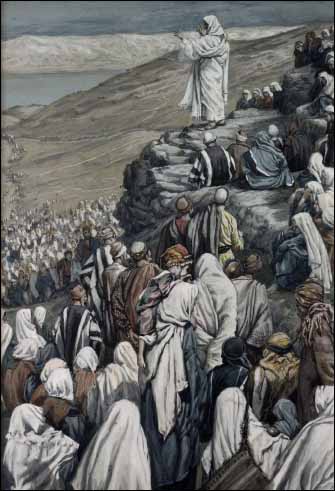In today’s Gospel from Matthew ( 5:17-37) Jesus is speaking about the law. It is also helpful to note that this passage follows one of Jesus’ greatest ‘homilies’; the beatitudes.
Jesus states clearly that he did not come to abolish the law, but rather to fulfill the law. (Matthew 5: 17) He lifts up the commandments as instructive and necessary for life, especially eternal life, as he draws direct connections between our actions and eternal consequences. Thus, we cannot easily or readily dismiss the commandments.
In fact, in today’s Gospel passage, Jesus teaches that the law demands even more of us than we may think. Of course, the law also offers us more than we realize! Here are just a few examples in Jesus’ own words:
• You shall not kill; and whoever kills will be liable to judgment. But I say to you, whoever is angry with his brother will be liable to judgment.
• You shall not commit adultery. But I say to you, everyone who looks at a woman with lust has already committed adultery with her in his heart.
• Whoever divorces his wife must give her a bill of divorce. But I say to you, whoever divorces his wife (unless the marriage is unlawful) causes her to commit adultery, and whoever marries a divorced woman commits adultery.
Jesus, as the Son of God, is the fulfillment of the law. Jesus, who is both human and divine is the lived expression of the law in all of its beauty and perfection. Thus, he concludes his teaching by saying that we are to be perfect just as our heavenly Father is perfect. (Matthew 5:48)
We may think this is asking too much. But is it?
God has written his law upon the heart of every human person. This ‘natural’ law is a part of us, by ‘nature’ as God created us. But, you say, the human person is also weak, and flawed by sin. Yes, and God has sent his Son as our remedy.
For the Christian, we are made new in the Risen Jesus. Through the shedding of his blood on the cross and his glorious resurrection, Jesus has claimed us for himself, and the fulness of life! He says exactly this in John’s Gospel: “I came so that they might have life and have it more abundantly.” (John 10:10)
In Baptism, Jesus shares the divine life with us, and lets us know that this is the life we are created for. Living now a life in Christ, we are given the grace and strength to live the law of God in all of its fulness. Thus, the divine law is not a restriction, but rather the path to greater and deeper freedom. Thus, St. Paul is able to say: “It is for freedom that Christ has set us free.” (Galatians 5:1) St. Paul also taught that “where the Spirit of the Lord is, there is freedom.” (2 Corinthians 3:17)
This freedom that is won for us by Jesus is not the freedom to do whatever we choose, but rather the freedom to live according to the law of God, and thus discover our greatest human potential, and bring to life true justice. This is what leads each individual to her greatest potential, and establishes the common good in the broader society.
We live in a world that does not always welcome God’s Word, nor God’s laws. In his recent Document, Beloved Amazon, Pope Francis encourages us to remain united in our faith in Jesus Christ, while being sober and honest about some of the worldly challenges we face:
And what unites us is what lets us remain in this world without being swallowed up by its immanence, its spiritual emptiness, its complacent selfishness, its consumerist and self-destructive individualism. (Querida Amazonia, paragraph 108)
I pray we are willing to honestly examine our behaviors and values through the lens of Jesus, his teaching, and his encouragement to live by the commandments of God. Where have we embraced the path of worldliness, which compromises the teachings of Jesus? Have we lost sight of the Kingdom of Heaven in choosing an easier path in this life?
Recall another practical encouragement of Jesus to his disciples: “Behold, I am sending you like sheep in the midst of wolves; so be shrewd as serpents and simple as doves.” (Matthew 10:16)
We seek to be blessed by God, and to be a blessing in return to others. Perhaps the psalmist sums up today’s teaching the best in saying:
“Blessed are they who follow the law of the Lord! (Psalm 119)
Peace,
+pde
